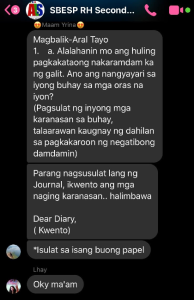This article was written by Aira Tose, a community organizer of CFSI under the Sama Bajau Education Support Project (SBESP).
Every time a notification pops up on his phone, 20-year old Aldazer gets excited. He’s been waiting not for a simple message, but for a chance to participate in an online learning session with his fellow Sama Bajau learners. As an Alternative Learning System (ALS) learner, Aldazer finds it interesting to still have the opportunity to learn online especially now that their village of Arena Blanco in Zamboanga City is under an enhanced community quarantine (ECQ) due to the COVID-19 pandemic.
The Local Government of Zamboanga City declared ECQ on 20 March 2020 as a preventive measure on the spread of COVID-19 in the city. It has restricted movement of people and enforced school closures to practice social distancing. All classes in both formal and informal schools were earlier suspended almost a week before the announcement including the class of Aldazer and 120 other Sama-Bajau learners in Arena Blanco.
Aldazer is one of the 400 beneficiaries of Sama Bajau Education Support Project (SBESP) of the Community and Family Services International (CFSI) in Zamboanga City. Sama Bajau is an ethnic group from the Philippines’ Sulu Archipelago and are known to be seafaring people. Because of their nomadic lifestyle, they are at risk of statelessness and had difficult access to basic social services like education. As such, the SBESP aims to help Sama Bajau adolescent children and young adults to access education through ALS.
When the ECQ was announced, Aldazer thought that he will never get the chance to learn again and spend time with his classmates, who are also his new found friends. But with the online learning sessions, he realized that education could be accessed even outside the corners of their learning facility.
The ALS Instructional Managers maximized the use of social media to extend learning opportunities for the learners. They created a group chat on Facebook where learners can access lectures and submit homework. They also meet virtually three to four times a week and conduct a three-hour online discussion, conducted at a time most conducive for learners considering their livelihood activities and parental duties. The platform is also used to share information about COVID-19 and the current situation of the city.

ALS Instructional Managers give homework to ALS learners through Facebook Messenger as part of their continued learning activities.
Focal learners are also assigned in different areas of the village to go house to house and share their lessons and homework with other learners who do not have a mobile phone or access to the internet.
Although sessions are not conducted face-to-face, Aldazer shared that learners are still eager to participate. The program has influenced the Sama Bajau community to prioritize education than expect children to fish in the sea and work early for the family.
Aldazer is also a Person with Disability (PWD) and shares that he faces a lot of discrimination. But he shrugs this aside and focuses on his study to become the first member of his family to finish high school and hopefully a college degree too. He also hopes to become a social worker someday to pay it forward and help people in need.
The COVID-19 situation may have suddenly shifted people’s lives but no kind of emergency can hinder a person’s will to learn. For Aldazer, all of life’s hurdles can be succeeded with determination, even a pandemic.
The SBESP is a project of CFSI with funding support from EDUCO Philippines. It aims to provide greater opportunities for 400 Sama Bajau adolescent children and young adults in Zamboanga City. The project adopts the ALS of the Department of Education to give beneficiaries access to education and the technical vocational skills training of the Technical Education and Skills Development Authority (TESDA) for increased employment opportunities. #

